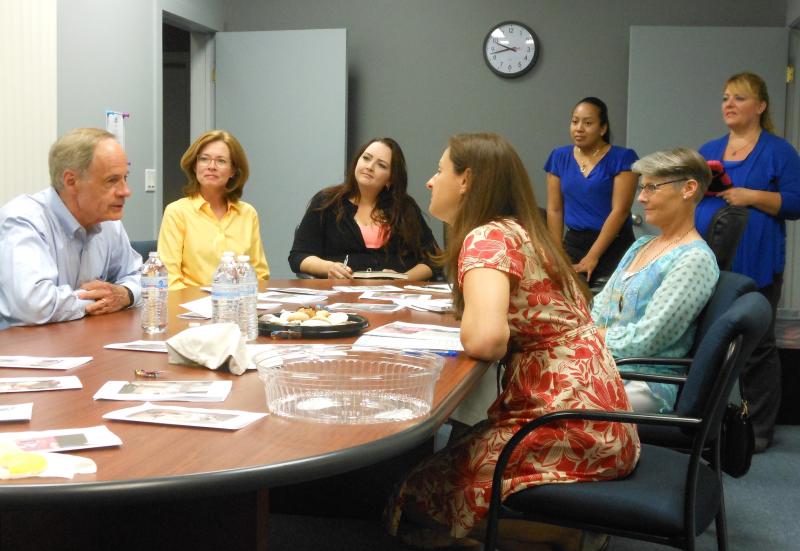Healthcare reform scares Delaware’s vulnerable

Susan Patel said she doesn’t know what she would do if her autistic son Rohan wasn’t able to find stable work through the help of Autism Delaware’s POW&R program.
Rohan works five-and-a-half hours a day, five days a week in a safe, productive environment, she said, explaining some of the challenges she faces with a man-sized, 24-year-old, whose sensitivities to noise can trigger violent confrontations. He is able to work because the POW&R program provides full-time staff members to help adults with autism spectrum disorders find employment, volunteer activities and recreation.
“He needs a job coach all the time,” said Patel to Sen. Tom Carper during his June 30 visit to Autism Delaware’s Sussex County office in Nassau Commons, outside Lewes.
The senator spent some of his July 4 break listening to stories on how a change in healthcare funding at the federal level could affect local Delawareans. Under the Republicans American Health Care Act of 2017, passed by the House in May, Medicaid funding to Delaware will be cut by $2 billion over 10 years. “So much is funded through Medicaid. There are no other options,” said Patel.
Autism Delaware’s Melissa Martin said the POW&R program, which stands for Productive Opportunities for Work & Recreation, is possible because of funding through Medicaid. She estimated Medicaid pays for 90 percent of the program. The remaining amount, she said, comes from the community helping fill the gap.
The assistant director for POW&R, Martin said reducing Medicaid completely contradicts standards being developed on how to best treat individuals with autism spectrum disorders. She said more individual-centered approaches are being instituted, but those approaches take resources.
“POW&R would be at great risk,” she said. “We can’t be individualized without being specialized.”
A second parent, Sharon Crist, was in attendance. She said her 25-year-old son Will is also able to work at a local restaurant because of the POW&R program. Will is able to prepare salads and appetizers, said Sharon, adding he’s been at this job now for four years. “Going to work is one of the things he loves,” she said.
Martin said it’s been her experience that people are quick to judge how Medicaid money is spent. She said people think that it’s a handout, only for old people and the poor. That’s not the case and it affects more than just the individual.
“It’s for individuals who wouldn’t have the opportunity otherwise,” she said. “They’d be at home with their families. The family unit is then stressed as well and are not able to participate in the community in the same robust way.”
For his part, Carper mostly listened during the meeting, but he is on the record as being strongly against the Republicans new healthcare proposal. “Cuts to Medicaid will derail the progress we are making on the opioid crisis in Delaware, and put seniors and those with preexisting conditions at risk,” said Carper, in a statement immediately following the release of the U.S. Senate’s version of the healthcare bill in mid-June. “We can do better.”






















































